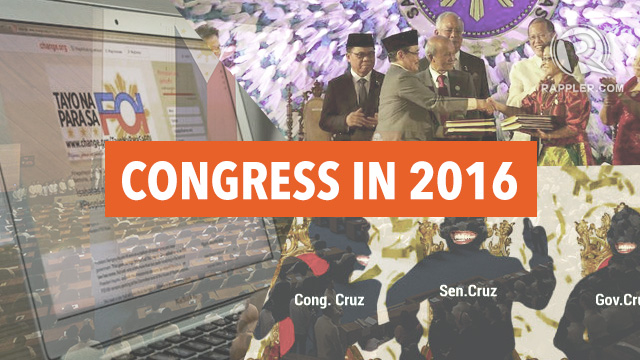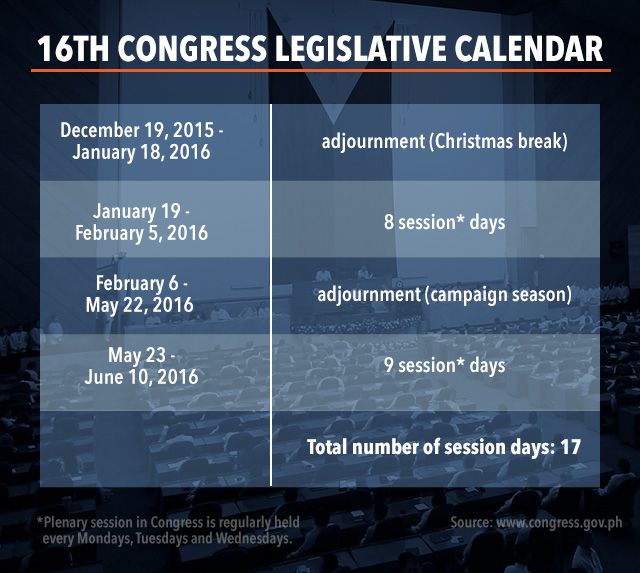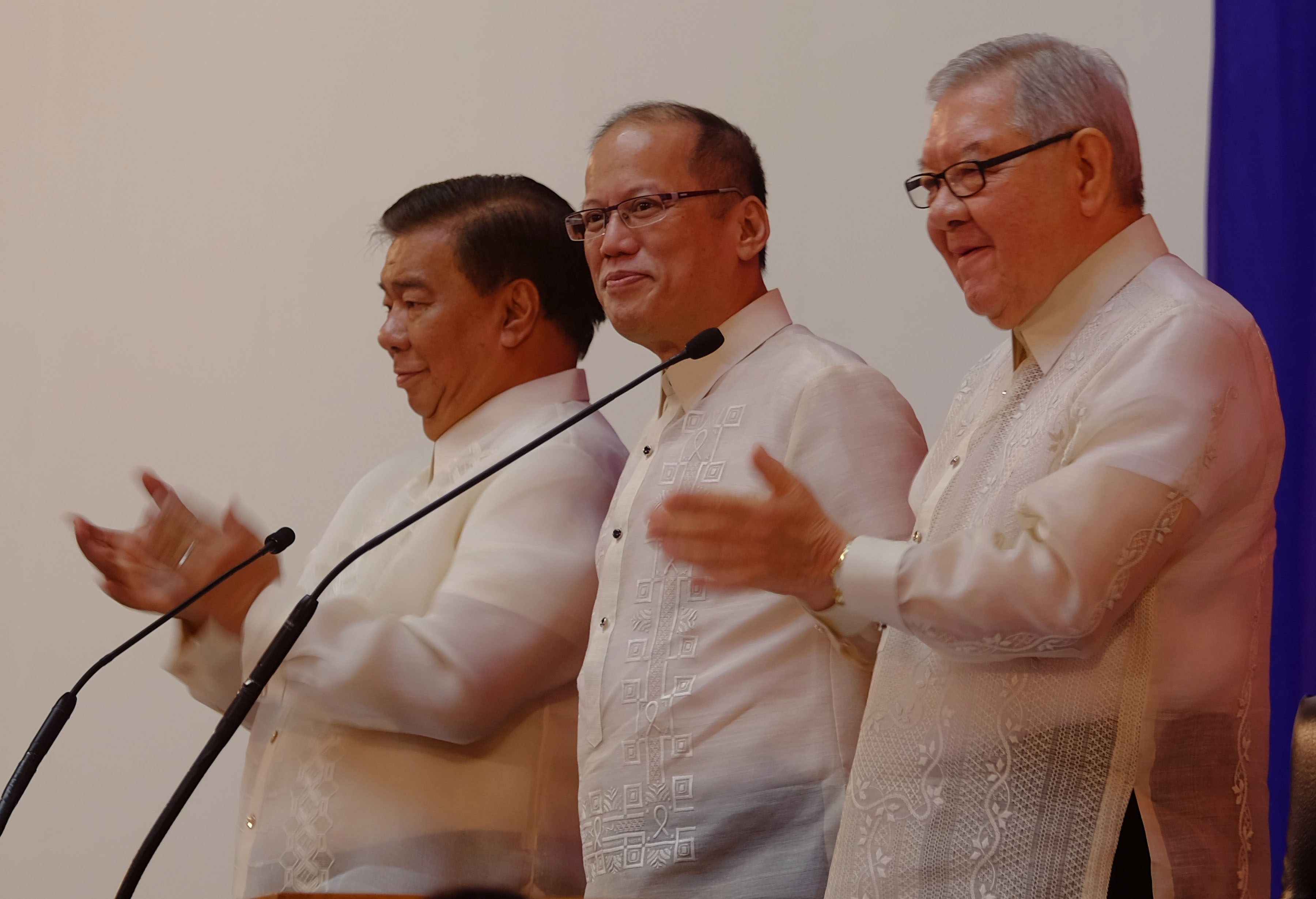SUMMARY
This is AI generated summarization, which may have errors. For context, always refer to the full article.

MANILA, Philippines – The year 2016 marks the homestretch for the 16th Congress to pass landmark measures that will serve as legacy of President Benigno Aquino III’s 6-year term.
Among the most thoroughly debated pieces of legislation under Aquino’s administration have been the proposed Bangsamoro Basic law (BBL), the Freedom of Information (FOI) Act, and the Anti-Political Dynasty Law. Yet they remain far from a final vote.
With half a year remaining in Aquino’s term, the legislative calendar becomes more complicated given the presidential and local elections in May. The current Congress has only 8 remaining session days before the campaign period. By June 30, a new batch of lawmakers, the 17th Congress, takes over.

This gives members of the 16th Congress a total of 17 regular session days to pass these key measures. Else, these proposals go back to square one and will have to be re-filed again in the next Congress, if lawmakers would bother to do so.
So what are the prospects for these 3 key measures?
Bangsamoro: Slightly hopeful
On January 25, 2015, dozens of Special Action Force (SAF) troopers on an anti-terrorist mission were killed in a clash with Moro rebels in Mamasapano, Maguindanao.
Because some of those involved in the clash were with the Moro Islamic Liberation Front (MILF), which had just forged a peace agreement with government, a number of lawmakers, responding to public clamor, became hesitant to pass the proposed Bangsamoro Basic Law.

A highly contentious legislation, the BBL would abolish the Autonomous Region in Muslim Mindanao (ARMM) and establish a more expansive and powerful Bangsamoro region. Its enactment will also implement the peace pact between the government and the MILF signed on October 15, 2012. (READ: TIMELINE: The long road to the Bangsamoro region)
Congress had been unable to meet the deadline for the passage of the bill, despite having moved it several times between June and December. Parties opposing the measure and the poor attendance among lawmakers were the primary reasons for the delay of its passage.
On December 16, as Speaker Feliciano Belmonte Jr hoped, the House of Representatives finished the period of interpellations before going on a month-long Christmas break.
The proposed BBL is now up for second reading and open for amendments.
“The second reading is preceded by amendments. That’s going to take some time for sure,” Belmonte told reporters in a gathering on December 17.
While he did not set high expectations for 2016, Belmonte noted that the latest version had been heavily amended and the “killer” opt-in provision – where local government units can belatedly vote to be part of the region after the plebiscite – has “more or less” been removed.
FOI: Aquino’s major failure
Civic groups and watchdogs have long been clamoring for the passage of the FOI bill, reminding President Aquino that when he was running for office in 2010, he vowed to pass it as part of his anti-corruption program.
It remains just a promise.
Aquino named it as one of his legislative priorities for 2015, and even endorsed it a day after his last State of the Nation Address (SONA) in July. Speaker Belmonte had also listed FOI as a priority measure a number of times. Still, the bill continued to move at a snail’s pace in the lower chamber. (READ: FULL TEXT: Belmonte details House priority bills)
A consolidated version of at least 20 right to information bills has been pending before the Committee on Rules since May 2015.
On March 10, 2014, the Senate passed the measure on 3rd and final reading. It has been waiting for the House version for concurrence since.
The minority in the House believes that failure to pass the FOI bill will be the greatest disappointment of the 16th Congress.
“This is the hallmark in his (Aquino’s) anti-corruption campaign,” Bayan Muna Representative Carlos Isagani Zarate told reporters a day before the House adjourned for the holidays. (READ: Aquino: FOI bill to pass under my term)
Anti-dynasty: Better luck next time
Time and again, the anti-political dynasty bill has been filed and re-filed in Congress for nearly 3 decades.
An Asian Institute of Management (AIM) study said that 74% of district representatives come from political families. In an institution consisting of members of political families, a measure that will prohibit their monopoly of power has a slim chance of passing, or none at all. (READ: How much of our country will we lose to political dynasties in 2016?)
During the start of his administration, Aquino, who also hails from a political clan, neither supported nor rejected the measure. But in his 6th and last SONA, he said it was time to pass the Anti-Dynasty Law.
Measures to restrict political dynasties have been filed in the House and the Senate, but these have practically not moved.
House Bill 3587, which substituted 3 other bills, was filed on December 16, 2013. It took about 8 months before it was taken to the plenary on May 6, 2014. The bill entered the period of amendments but stopped there, marked with a status of “unfinished business” as of 2015.
In the Senate, 3 bills have been filed since mid-2013 but, after the first reading, they stayed with the committee on electoral reforms and people’s participation. (READ: Senate anti-dynasty bill allows only 1 Binay in office)
Belmonte: ‘P’wede pa‘
Still, Belmonte said the FOI and the anti-dynasty bills might still see the light of day in 2016.
“Theoretically, yes, we can [still pass it],” he said, despite the limited number of session days that remain.
As long as congressmen arrive at a consensus, he said, these measures might be passed.
Belmonte said the FOI bill appears to be the most difficult to get through the legislative process, followed by the anti-dynasty bill, then the “little loosening up of the bank secrecy act.”
“All of them would appear to be undoable now, but as we talk about them, they (congressmen) might be able to reach consensus.” – Rappler.com
Add a comment
How does this make you feel?

There are no comments yet. Add your comment to start the conversation.